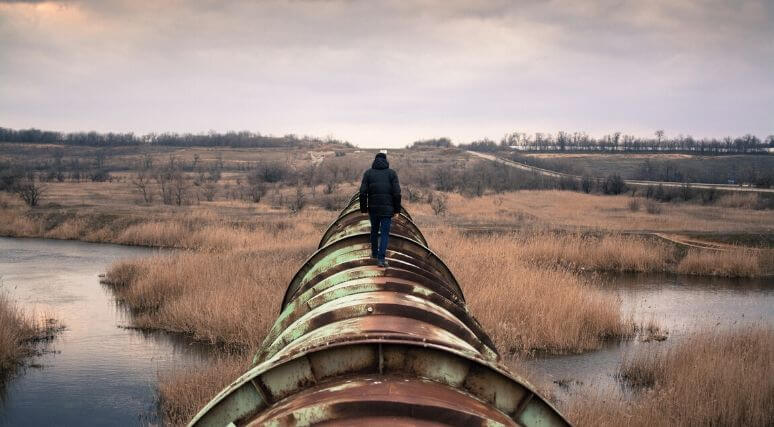
The agreement reached by the First Nations Climate Initiative table and the First Nations Major Projects Coalition should change the way Canadians understand Indigenous aspirations for the environment and economic development, writes Chris Sankey.
(February 19, 2021) Not enough has been said about the recent Memorandum of Understanding between the First Nations Climate Initiative table and the First Nations Major Projects Coalition, which represents 70 First Nations from across Canada. In December 2020, the two parties signed an agreement to advance an Indigenous-led, net-zero carbon-emissions policy framework, including nature-based solutions for carbon capture. This is a major step forward in responsible resource development in Canada.
Indigenous leaders and our communities have been pushing in this direction for the last decade. This agreement is just another example of what First Nations can achieve when we work together without outside influence. And it raises a new question: why have environmentalists been silent about one of the most significant developments in several decades?
This initiative answers many, if not all, of the concerns presented by the agenda-driven activists and environmental groups that have spent the last 20 years trying to tell us what to do. Our communities worked with the brightest minds in academia and industry to develop a First Nations-centred solution that accommodates both climate change realities and appropriate resource development, which will bring much needed opportunities to our people.
What have the boisterous, assertive, and agenda-driven activists accomplished? I will tell you what they accomplished.
Families have been torn families apart. The country has forfeited billions of dollars in lost opportunities and tens of thousands of jobs. Our communities have been gripped with grief, anger, and resentment. Money has been taken out of the hands of our people, undermining the ability of communities to be independent. Immense divisions now divide our communities across the country.
The consequences are real and serious. By ignoring Indigenous requests – and by listening to only those community members who share their preservationist world view – the environmentalist agenda has stripped away our capacity to pay for necessary infrastructure such as housing, roads and commercial buildings. They stole opportunities for us to fund the advancement of our arts, culture, and language. Far too many communities remain welfare dependent, relying on the government to pay for our basic needs.
This is both unnecessary and destructive to Indigenous communities. The environmentalists love to use our ceremonies, symbolism, even our spirituality, when it suits their purposes. But when the legal and political battles are over, they leave our communities and do nothing to address the deep inter-generational poverty that they are now helping to entrench.
First Nations are fighting to get away from their dependence on government and determine their own futures.
So, do the actions of environmental groups advance the cause of Indigenous sovereignty and self-reliance? The answer is simple: they do not. Their actions keep many of our communities impoverished. The result is eco-colonialism, just another incarnation of the colonial systems we are trying to escape. Paternalism, it seems, dies a hard and slow death.
Environmental non-governmental organizations (NGOs) receive millions of dollars in donations from outside interest groups, allowing them to pay key organizers and hire activists to protest in our communities or to declare (typically without our consent) their support for First Nations’ causes. None of the money raised by these organizations goes to meet the needs of our people. When the protests are over, their work has only served to deny First Nations a chance to share in Canada’s prosperity.
While protesters build nothing in our communities, First Nations’ elected governments and our industry partners provide well-paid jobs, training, and certification for Indigenous workers. Industry collaborations produce long-term infrastructure and provide funds to support our healthcare and education systems, our elders’ needs, and our language and cultural programs.
Let me be frank; First Nations do not need environmentalists or any other outsider groups to shape our future. We can fight our own battles, on our own terms, based on our own rights and interests. The eco-colonialists need to stop telling us what to do. It is not up to governments or activists to develop policies and force Indigenous people to live by them.
Canadians should be incensed that these agenda-driven activists still try to dictate how we should manage our traditional territories. This is completely unacceptable. It needs to stop, and it needs to stop now. Their actions are literally tearing families apart.
These interventions by outside environmental activists must be addressed. We will have these debates inside and between our communities, thank you very much. As Ottawa has a responsibility toward the well-being of Indigenous peoples, those at the highest level of authority must step up and start holding these groups accountable for their destructive acts against our communities. First Nations can no longer allow unknown activists to destroy our people and communities.
The agreement reached by the First Nations Climate Initiative table and the First Nations Major Projects Coalition should change the way Canadians understand Indigenous aspirations for the environment and economic development. First Nations care about our future, our people, our environment, and our country.
We have been waiting for environmentalists to applaud this impressive achievement. But we do not need their approval, just like we do not need their lectures and interventions. First Nations, as economic developers and as defenders of the environment, have their future well in hand.
Chris Sankey is a senior fellow at the Macdonald-Laurier Institute and a former elected Councilor for the Lax Kw’alaams Band. Additionally, he is a prominent Indigenous business leader.
